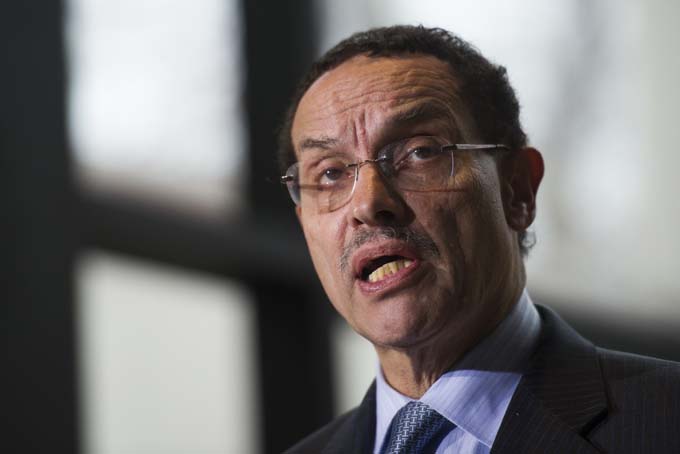
In awkwardly timed remarks 24 hours after dramatic campaign-corruption allegations were leveled against him, Washington, D.C., Mayor Vincent Gray defied rumors of his political death spiral.
“I did not break the law,” pronounced the mayor to a very pro-Gray crowd of several hundred this past Tuesday night, who complimented the moment with stand-up chants of “four more years.”
That night in a Northeast D.C. auditorium, Gray may have temporarily reenergized “Chocolate City.” But the campaign now headed to a hotly contested April 1 Democratic primary for his hoped-for reelection finds a Black urban apotheosis a shell of what it was more than two decades ago.
Put simply: Vincent Gray will likely be remembered as the last Black mayor of Washington, D.C.
This is a very difficult reality for many longtime Black Washingtonians who’ve warily watched the transformation unfold. Washington, D.C., always stood out among Black America’s prized cultural possessions. It was always the nation’s capital, but it was the undisputed hub for the nation’s largest concentration of middle-class African Americans. It didn’t have the music or arts muscle of New York City, Philly, Detroit or New Orleans (because it’s not like Go-Go music took off), but it didn’t need that, as the unparalleled nexus of Black political, academic and business interests earned the city its flavorful nickname. Harlem was Black retail while D.C. was Black wholesale. Conceptualization versus decision-making. Grassroots versus grasstops.
Now, Chocolate City finds itself remarkably saran-wrapped into a pulpy gentrifying fondue of vanilla, caramel and fudge complexions. Wicked-fast socioeconomic transitions have brutally displaced its Black core and moved them into the suburbs. Black population shifted from 70 percent in 1992 (when I first arrived) to just more than 50 percent now in the city. Alas, this is the fate of Black urbana: Gotham resets invigorated by recession, urban Blacks sandblasted by waves of young, hipster and mostly White urban professionals and adventurous start-uppy pioneers. Meanwhile, suburban poverty is on the rise.
Nationally, that change is hitting an old-guard Black political establishment hard, long complacent and apathetic behind the security blanket of their protest machines. Detroit—a hulking, bankrupted mass of abandoned buildings—just elected its first White mayor in four decades, still reeling from the apocalyptic mismanagement of convicted former mayor and political family scion Kwame Kilpatrick. Post-Katrina New Orleans elected its first White mayor after three decades of Black rule, worn out from corruption and malfeasance, while recently convicting former Mayor Ray Nagin as if rudely shutting the Big Easy’s Black political chapter for good.
D.C. is next. Yet, the shockwaves will reverberate nationally, given its influence as the center of things.
A recent Washington Post endorsement of Councilwoman Muriel Bowser for the Democratic primary seemed to resurrect hopes that perhaps it was just the end of Black male dominance in local politics. And recent polls show Bowser neck in neck with the incumbent, 18 percent to 23 percent in her own internal poll, and in second place at 20 percent in an NBC4-WAMU-Washington Informer-Marist College poll.
But, any Democratic nominee will be a deer in headlights once the general election arrives, and they find themselves facing seasoned White and openly Gay Councilman David Catania, an independent former Republican who will have plenty of time to raise money and troops for the ground game in November. Catania showed up at 40 percent against Gray’s 43 percent in a hypothetical Washington Post polling match back in January, but that was before Black millionaire Jeffrey Thompson dropped a dime on Gray this week in the wake of a plea deal with federal prosecutors.
If Catania is that strong against an extremely wounded Gray, then he’ll be eating Bowser (a presumed primary winner) for lunch in the general—even as an independent. All it takes is years of Catania earning good will with Black voters in some of the city’s poorest wards and the respect of a rising young electorate that’s watched his fanatically precision-guided crusade to fix D.C. public schools.
But, more importantly, D.C. houses the largest concentration of LGBT residents in the country at 10 percent, an entire 5 percentage points ahead of Hawaii in second at 5 percent, according to Gallup. The city’s massive LGBT population will come out strong for Catania, perhaps setting the stage for a rather public schism between the city’s influential White gay elite and its quickly deteriorating Black political bloc. Catania is in a position from which he can easily cobble together a coalition of disenchanted Black voters, disgusted White voters, underappreciated Latino voters and ambitious Gay voters looking to make a mark.
The five Black candidates in an overcrowded Democratic primary field are not only threatened by split votes. Nor is it so much the shadowy campaign financing that’s draping a dark cloud over the city’s tight-fisted Black political machine. Demographics had been leaning in this direction for some time, this latest episode simply accelerating a forgone conclusion. Whiter newcomers want their bike lanes, dog parks and better schools sans the stigma of Marion Barry on a crack pipe. In 2014, I predict Chocolate City will melt into a history tour.
(Charles D. Ellison is a veteran political strategist and frequent contributor to The Root. He is also Washington correspondent for the Philadelphia Tribune and chief political correspondent for Uptown magazine. Follow him on Twitter.)